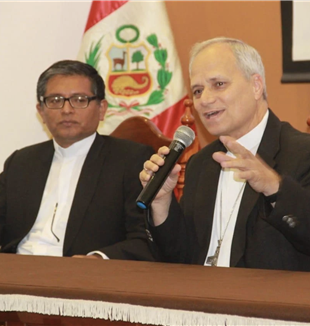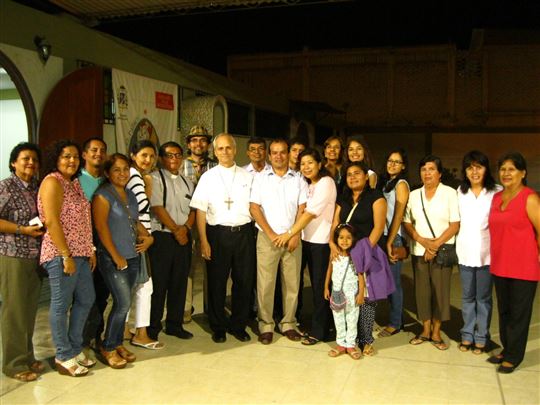
“He has always belonged to Christ and never stopped bearing witness to this”
Fr. Marcos Ballena Renteira, former rector of the seminary in Chiclayo, talks about his relationship with Robert Francis Prevost, his friend who became pope, and of his friendship with the local CL communityIn 2014, Fr. Marcos Ballena Renteria was bursar and formator at the major seminary in Chiclayo, Peru, where he also accompanied the small CL community. He had met the movement in 1988 as a student, through Fr. Francesco Ricci and Andrea Aziani.
“I was happy to serve at the seminary,” he recounts, “and that year a new apostolic administrator for our diocese arrived: Monsignor Robert Francis Prevost. It was November, and the first thing he did was come to meet the seminarians. We met there, and it was the beginning of a great friendship.”
The Peruvian priest is moved as his friend has now become pope. He still can hardly believe it. “We are celebrating, moved and grateful, because he has been a father and a good shepherd in the years he spent here. And I am sure that the compassion, faith, and charity he lived among our people will be the same gifts he brings to the Church as Pope Leo XIV,” says Fr. Marcos.
Some episodes illustrate this well. “In 2017, Prevost asked me to become rector of the seminary. It was a big responsibility because there were so many young men to form, but I gladly accepted within a relationship of unity with him,” with whom he also shares a background in mathematics. “We enjoyed talking about mathematics at length, even having little competitions, but, to be clear, he was never a calculating man, never about power. “He has always belonged to Christ and he never stopped bearing witness to this.”
His belonging “to Christ” manifested itself in his total availability towards others. “He would hear confessions whenever asked, at any hour, and he would engage in dialogue with both the most important individuals and the least. He would meet with families, children, and truly spent time with them eating together, chatting, listening to everyone. He did not live his ministry in a formal way. He was always at the service of the people.”
During the pandemic, which was particularly devastating in a fragile country like Peru, “people were dying without assistance, alone.” Prevost, Fr. Marcos recounts, “did everything possible to reach everyone, to obtain an oxygen dispenser that was then installed at the local Caritas office. For months, we were able to provide oxygen free of charge to many Covid patients.”
A number of images are stuck in Fr. Marcos' memory: Prevost wading through mud to help during the terrible floods caused by El Niño; a celebration for an elderly priest's birthday with songs and dancing; the future pope cooking because a woman was ill and could not get up.
He also recalls some personal conversations that supported him in dramatic moments. “I wavered when there was a tuberculosis outbreak at the seminary and when I lost my brothers during Covid,” he recounts. “Monsignor Prevost was always close to me like a discreet but loving father, always pointing me back to Christ. He did not want me to lose sight of Christ. So when in 2022 I confided in him about my struggle and need for rest, especially since I had got Covid twice, he, as my superior, understood and accompanied me.”
The small Communion and Liberation community in Chiclayo was also touched by the presence of the man who would become Leo XIV. Fr. Marcos recounts, “He never said no to our invitations: he came to celebrate Masses organized by the Movement, to the presentation of the book on Fr. Giussani's life, and on many other occasions.”
“On another occasion – after spending a day together that included the screening of a video on Fr. Giussani – he told us that he wished all his priests could encounter a place like School of Community. So, I can say this: I do not know what his pontificate will be like, but I know what his roots are.”
These are the pillars of his personality, as Fr. Marcos knew him in Chiclayo: “A great faith, because he always wanted to keep time for prayer during his days; much study, as he spent every free minute reading and informing himself, with great curiosity; and finally, great charity, understood as the gift of self in the encounter with others.” Quiet, discreet, sometimes ironic. Always present. In his first homily as Pope, Leo XIV said, “It is to move aside so that Christ may remain, to make oneself small so that He may be known and glorified, to spend oneself to the utmost so that all may have the opportunity to know and love Him.”
And Fr. Marcos, who is now chaplain of the Catholic University of Chiclayo and director of a large educational organization, has no doubts: “Let us go forward, each where we are called. He is now in Rome, we are here. And from here, we will not stop praying for him.”